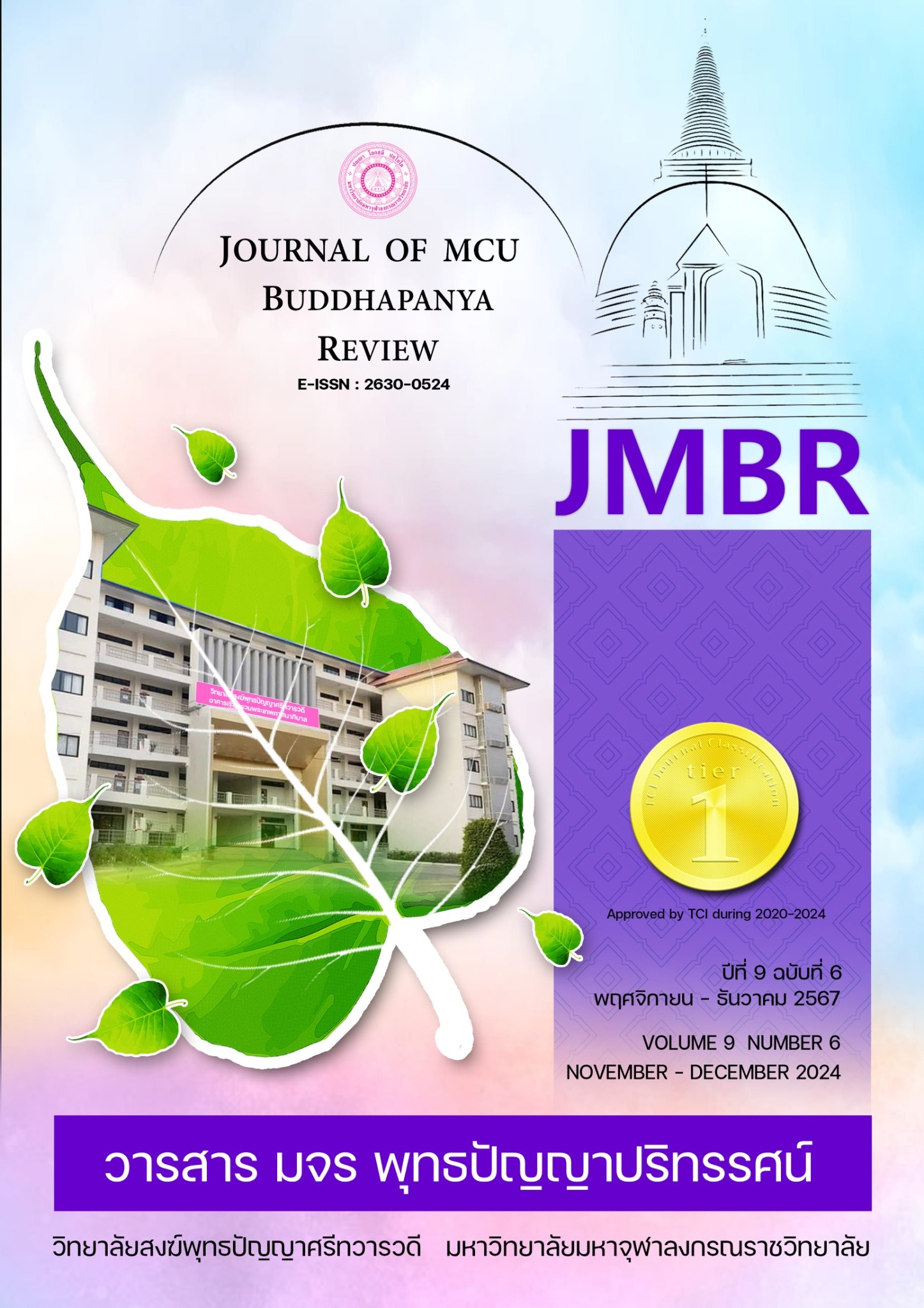NOBLE HAPPINESS ACHIEVING SUSTAINABLE AGRONOMY TO SUSTAINABLE DEVELOPMENT: ANALYTICAL PERSPECTIVES FROM CASE STUDIES OF THAILAND’S MODEL COMMUNITIES TOWARDS CONTINUE, SUSTAINABLE, AND DEVELOPMENT
NOBLE HAPPINESS ACHIEVING SUSTAINABLE AGRONOMY TO SUSTAINABLE DEVELOPMENT: ANALYTICAL PERSPECTIVES FROM CASE STUDIES OF THAILAND’S MODEL COMMUNITIES TOWARDS CONTINUE, SUSTAINABLE, AND DEVELOPMENT
คำสำคัญ:
Sustainable Agronomy, Noble Happiness, Sufficiency Economy Philosophy (SEP), Model Communitiesบทคัดย่อ
The aim of this research is threefold: 1. to gather knowledge related to the Sufficiency Economy Philosophy (SEP)towards Continuity, Sustainability, 2. to compile indicators of success factors in Sustainable Agronomy derived from the application of the Sufficiency Economy Philosophy (SEP) in the dimension of Noble Happiness from model communities, and 3. to extract lessons from organizations/model communities that have applied the Sufficiency Economy Philosophy (SEP) leading to sustainable practices aligned with health goals using SDG 16 (Peace) as a comparative measure. This will be achieved through qualitative research methods, involving the examination and analysis of data derived from documents or research, by reviewing relevant concepts, theories, and literature including data form The Community Development Department, 2022 to collected data from villages around 6 Royal Initiative Development Study Centers, a total of 145 villages, including Chanthaburi, Chachoengsao, Phetchaburi, Narathiwat, Chiang Mai and Sakon Nakhon provinces. Primary data inputs from qualified experts in related fields via focus group with 20 Key informants. The study found that model communities have three key dimensions: 1. Social aspects, such as fostering community bonds and solidarity, establishing community learning centers, and having knowledgeable local teachers within the community, 2. Economic aspects, including households effectively managing expenses to increase income, promoting the community as a tourism destination, and creating platforms for economic education to enhance income, and 3. Environmental aspects, such as sharing practical knowledge among households within and outside the village, having core organizational groups within the community for natural resource conservation and environmental protection. These three dimensions are crucial in guiding the application of the Sufficiency Economy. Philosophy (SEP)alongside the adoption of new agricultural theories focusing on water management and appropriate land allocation. This ensures farmers have sufficient food resources, addressing livelihood challenges and contributing to overall economic stability in the country.
เอกสารอ้างอิง
Building Rmutr. (2021). What are SDGs? How important is it? Retrieved from https://building.rmutr.ac.th/sdgs-%E0%B8%84%E0%B8%B7%E0%B8%AD%E0%B8%A.
Institute for Human Rights and Peace Studies Mahidol University. (2023). Curriculum and teaching. Institute for Human Rights and Peace Studies. Retrieved from https://ihrp.mahidol.ac.th/th/course/.
Library of Parliament (2022). Sustainable development goals. Retrieved from https://thailand.opendevelopmentmekong.net/th/topics/sustainable-development-goals/.
Ministry of Foreign Affairs of the Kingdom of Thailand. (2016). A Practical Approach toward Sustainable Development: Thailand's Sufficiency Economy Philosophy - A Practical Approach toward Sustainable Development: Thailand's Sufficiency Economy Philosophy OD Mekong Data hub. Retrieved from http://thaiembdc. org/wp-content/uploads/2017/03/A_Practical_Approach_toward_Sustainable_Development.pdf.
National Economic and Social Development Office. (2020). Goal 16: Promote peaceful and inclusive societies for sustainable development. Give everyone access to justice and build effective institutions Responsible and comprehensive at all levels. Retrieved from https://sdgs.nesdc.go.th/%E0%B9%80%E0%B8%81%E0%B8%B5%E0%B9%88%E0%B8%A2%E0%B8%A7 %E0%B8%81%E0%B8%B1%E0%B8%9A-sdgs.
Office of the Justice Fund. (2021). Justice Fund Operational Standards Manual. Retrieved from https://jfo.moj.go.th/file-links/%E0%B8%84%E0%B8%B9%E0B8A3%E0%B8%A1.pdf.
Office of the National Economic and Social Development Council. (2020). Master plan under the national strategy (20) issues of public service. and efficiency of the public sector (2018-2037). Retrieved from http://nscr.nesdc.go.th/wp-content/uploads/2019/04/20-%E0%B8%81%E0%B8 %.pdf.
Penpim P, Supaprawat S, Siriporn P, Nuttharin P, and Vilasinee K. (2024). Enhancing Community
Economic Sustainability Based on Cultural Capital and Local Wisdom Knowledge Management: A CaseA of Klong Maduea, Samut Sakhon. Journal of MCU Buddhapanya Review Vol. 9 No.2. P.1-16.
Phratammasakawongvisutthi. (2022). Five principles of civilization. Photocopied documents. World Buddhist University. 2022. Cited in Phra Dhamma Sakyawongwisut. and the Faculty of Sustainable Agronomy Society that leads to society “Longevity Economy” and “Longevity Dividend” analytical approaches to study the connection Photocopied documents. World Buddhist University. 2023.
Puchiss S, Kritsana D, and Sittiporn K. (2024). Developing employees' happiness in the workplace in Pathum Thani Province. Journal of MCU Buddhapanya Review Vol. 9 No.2. P.225.
Royal Initiative. (2023). Philosophy of Sufficiency Economy. Retrieved from www.pidthong.org/philosophy.php.
SDG Move. (2023). Table showing target values and results of the Sustainable Development Report (2023) of Thailand. Retrieved from https://www.sdgmove.com/wp-content/uploads/2023/06/SDR23-REPORT_WP-1024x536.png.
Sustainable Development Report. (2023). Implementing the SDG Stimulus Includes the SDG Index and Dashboards. Published by Dublin University Press Dublin, Ireland, 2023.
SDG Port. (2023). Goal 16: Peaceful, just, inclusive society (SDG 16: Peace, justice and strong institutions). Retrieved from www.sdgport-th.org/2020/10/sdg16-peace-justice-and-strong-institutions/.
The Community Development Department. (2022). Model village 9;10 practices worship “continuing, preserving, expanding” according to the royal initiative 2022. Retrieved from https://district.cdd.go.th/taongoi/2022/06/29/%E0%B9%82%E0%B8%84%E0%B8%A3%E0%B8%87%E0%B8%81%E0%B8%B2%E0%B8%A3-9-10-%E0%B8%9B%E0%B8%8F%E0%B8%B4%E0%B8%9A%E0%B8%B1%E0%B8%95%E0%B8%B4%E0%B8%9A%E0%B8%B9%E0%B8%8A%E0%B8%B2-%E0%B8%AA%E0%B8%B7-2/
The Journalist Club. (2021). Royal speech "Ariyakaset/Sustainable Agronomy" of His Majesty the King. Retrieved from https://thejournalistclub.com/
United Nations Thailand (2022). Sustainable Development Goal 16: Peace, justice and strong institutions. Retrieved from https://thailand.un.org/th/sdgs/16.
WBU World. (2023). Continuing, Sustainable, Development towards
becoming Noble Happiness. According to the goals of balanced development. Retrieved from https://wbu.world/wbu-conferences-seminars/septosdgs/.
ดาวน์โหลด
เผยแพร่แล้ว
รูปแบบการอ้างอิง
ฉบับ
ประเภทบทความ
สัญญาอนุญาต
ลิขสิทธิ์ (c) 2025 วารสาร มจร พุทธปัญญาปริทรรศน์

อนุญาตภายใต้เงื่อนไข Creative Commons Attribution-NonCommercial-NoDerivatives 4.0 International License.



